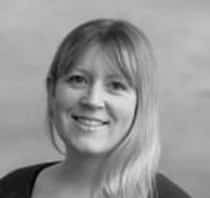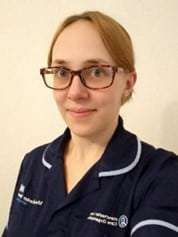8th November 2024
At the iHV we always enjoy celebrating and sharing success stories in health visiting. Today we are thrilled to announce the winner and runners up of this year’s iHV 2024 SCPHN Student Health Visitor Award.
In 2023 we announced the new iHV SCPHN Student Health Visitor Award to shine a light on the work of student health visitors. The award is also an opportunity to celebrate new talent and health visitors of the future.
We recognise how studying to become a registered SCPHN health visitor can be exciting, daunting and challenging. However, the commitment to improve outcomes for babies, children and families acts as an important drive during what can be the most demanding period of a health visitor’s career. The contribution student health visitors make really is incredible.
It gives us great pleasure to announce this year’s winners of the iHV 2024 SCPHN Student Health Visitor Award.
Huge congratulations to:
- 1st place – Nicola Taggart, student health visitor, Manchester Metropolitan University
- 2nd place – Rutendo Tafangombe, student health visitor, Birmingham City University
- 3rd place – Monika Kwoka, Canterbury Christ Church University
Thank you to all those who submitted to the award. The judging panel enjoyed reading all submissions, which were of a high quality. We extend our thanks to last year’s 3rd place runner up Robin Williams, for joining the panel of judges this year.
Nicola Taggart, 1st place winner, and her academic assessor Karen Hughes have been awarded a complimentary place at the iHV Leadership conference in London on 4 December 2024 where Nicola will present on her innovation and receive her award.
Find out more about Nicola, Rutendo and Monika below through their short biographies where they tell us about how they became a SCPHN health visitor and why they submitted to the iHV SCPHN Student Health Visitor Award.
1st Place winner
Nicola Taggart, SCPHN Health Visitors Student, Manchester Metropolitan University.
“I feel extremely grateful to have received the iHV Student Award. The Little Library has been not only a project, but my passion over the last year, and I am delighted that the award panel have recognised its value and impact in promoting children’s speech and language development. I look forward to sharing the message at the iHV Leadership Conference and, hopefully, encouraging more Little Free Libraries across the country”.
I am currently a newly qualified Health Visitor working within the Manchester Local Care Organisation team at Manchester University NHS Foundation Trust, having recently completed my Specialist Community Public Health Nursing (SCPHN) programme at Manchester Metropolitan University. I have been a registered adult nurse for five years and worked within district nursing and early pregnancy care prior to joining the health visiting workforce. I felt privileged to work with parents experiencing early pregnancy difficulties, but had always felt my passion lay in supporting parents in later pregnancy and the transition to parenthood. Inspired and encouraged by my own health visitor, I applied for the SCPHN course whilst on maternity leave following the birth of my second child and once settled in my new role, felt I had finally found my place within nursing.
During my studies, I observed an increasing prevalence of speech, language and communication delays in children under 5 within my placement area. I explored the interventions offered locally to support speech and language development, and identified that families struggled to access free and age-appropriate books due to the absence of a community library in the area. Working with other agencies and members of the local community, I utilised an asset-based public health approach to develop a Little Free Library within the community health centre. I intended to create a sustainable resource, with books borrowed, donated, and read in the waiting room. On evaluating the project, I received overwhelmingly positive feedback from parents and children alike, and reach was estimated at over 340 people in the first 8 weeks. Providing books within healthcare environments enables children, parents and families to benefit from every shared reading opportunity, and I submitted an abstract to the iHV hoping to share this message.
Nicola’s academic assessor at Manchester Metropolitan University, Karen Hughes, supported Nicola’s submission to the iHV awards and was thrilled to hear she had won 1st place:
“I’m so thrilled for Nicola, Nicola was an outstanding student from the outset, she showed total commitment to the SCPHN Programme, her studies and developing into the best possible HV throughout the year. It was such a pleasure to teach and support her and I believe she will be a wonderful asset to the HV profession, her new team and all the families she works in partnership with.
“As a team we are thrilled because we believe we are preparing and equipping the MMU students to not only be ready for their new professional roles, but also filled with passion for HV and compassion for people and ready to be determined leaders who will champion HV and lead the way forwards.
I’m also thrilled to be able to attend the iHV conference again, last year was so inspiring”.

Karen Hughes, Senior Lecturer and SCPHN Health Visiting Programme Lead, School of Nursing and Public Health, Manchester Metropolitan University
2nd Place runner up
Rutendo Tafangombe, SCPHN student health visitor, Birmingham City University
“I am over the moon to have been awarded 2nd place. It is such an honour and a privilege to be in a position to potentially influence positive changes in the community, especially one that I’m passionate about. I am excited for my HV career!”
I am a SCPHN health visitor student at Birmingham City University employed at Birmingham Community Healthcare Trust. I have been a Registered Adult Nurse for a decade, having studied at King’s College London. Most of my nursing experience is in Endoscopy, which I thoroughly enjoyed, although very different to community nursing.
My interest in health visiting started when I had my second child just after relocating, meaning I had no family or friends nearby. I remember the health visitors being knowledgeable, friendly and supportive during their visits, and encouraging me to attend local mum and baby groups. At the time they mentioned how understaffed they were, and that sparked my interest as I felt that I would want to provide the amazing service I had to other new mums. I decided to wait until my children were all in school, and six years later here we are.
During my studies I explored parental depression and found that research often focuses on mothers; however, it is estimated that between 10-25% of fathers experience postnatal depression following birth – but as fathers are not routinely asked about their mental health this is likely to be an underestimation. Considering the potential short and long-term effects of paternal postnatal depression, support during the perinatal period is of paramount importance, with health visitors being well placed to do this.
My innovation proposal involved a leaflet which would be made available in different languages, which would help increase awareness and reduce stigma by utilising opportunities within the delivery of the Healthy Child Programme, led by health visitors, that already exist. Working in partnership with local organisations such as Acacia and national organisations such as the Fatherhood Institute, information in the leaflet would provide information on how fathers may experience changes in their social, emotional and relationship roles and how these may impact on their mental health, themselves and their child[ren]. Fathers and their mental health may not be identified as priority when there is a focus on the mother and baby. This innovation will remind fathers, mothers and professionals that they matter too and ensure that they have access to the care and support they need. The success of this initiative could be measured by obtaining and recording feedback from fathers in the form of a short questionnaire.
My hope for my future career is to continue to work towards this initiative to enable health visitors to provide better support to new fathers and their mental health, promoting a more co-ordinated, personalised, family-centred approach to care.
3rd Place runner up
Monika Kwoka, SCPHN student health visitor, Canterbury Christ Church University
“I am truly honoured and grateful to receive 3rd place for this year’s SCPHN student award. When hard work meets recognition, it triggers happy emotions and empowerment.
“I am hoping that this recognition will inspire others to challenge themselves to search for families in need. I believe that with kindness, care, active listening, determination, and willingness to help, we can overcome obstacles and improve people’s lives.”
I studied Specialist Community Public Health Nurse Health Visiting at Canterbury Christ Church University and I am now a newly qualified health visitor employed by Kent Community NHS Foundation Trust (KCHFT). Before this I qualified as a midwife in 2021 and began employment with KCHFT as a community public health nurse in January 2022. I aspired to become a health visitor after I had my own children, the positive experience of the service and the nature of the job prompted me look into this profession. In my first year of midwifery practice, I chose to work with my local health visiting team in Ashford and my positive experience during practice placement only reinforced my aspirations.
During the SCPHN course, I chose to focus on the third sectors for my alternative placements as I wanted to be able to connect families in need to local services and charities. One of my chosen places was the Salvation Army (SA). While there I discovered families who didn’t seek support from health visiting services. Families reported feeling judged and lacked trust in the service, with many mothers needing mental health support, breastfeeding support, and general health promotion advice. I felt disheartened after learning that some families in SA had negative perceptions of health visiting services. I reflected on the possible causes of this and was keen to work with families, to understand more about how they formed their perceptions and to possibly influence change. I discussed my experience with my manager who fully supported my desire to continue to connect with families at the SA.
For my leadership module, I wrote a feasibility report and proposed a project to connect with families at SA and was awarded a distinction. I implemented the project which was underpinned by the 6 C’s (NHS 2015), Making Every Contact Count (Public Health England [PHE] 2016), and adhered to the No Child Left Behind policy which aims to eliminate the challenges that poverty creates (PHE 2020). I also followed KCHFT Trust’s values. It was a challenging process at the start, as families would not engage with me or even speak to me. I was fully aware that changing behaviours or perceptions is not easy, however, I was determined that by demonstrating my care and interest to support families, I could communicate and build connection with them, and influence their views on health visiting for the better. Through my work with SA, I transformed some families’ perceptions and increased their trust in the health visiting service.
Nicola, Rutendo and Monika will be joining us in a series of iHV podcasts where you can hear more about their innovations.









